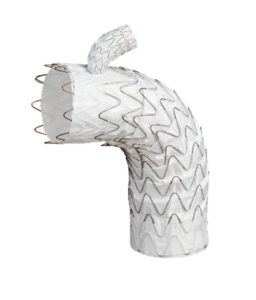
Gore has announced the first commercial use of the Gore Tag thoracic branch endoprosthesis (TBE) in Canada.
The news came as Canadian government health authority Health Canada approved the first-of-its-kind endovascular device, which is indicated to treat lesions of the descending thoracic aorta while maintaining flow into the left subclavian artery (LSA) in patients with appropriate anatomy.
Designed for thoracic endovascular aortic repair (TEVAR) procedures, the Gore Tag TBE provides a minimally invasive option in patients requiring aortic treatment into zone 2 across the left subclavian artery.
For surgeons Randy Moore, MD, Kenton Rommens, MD, Scott McClure, MD, Holly Smith, MD, and Eric Herget, MD, of the Calgary Aortic Program team at the University of Calgary in Calgary, Canada, the implantation marked a significant moment for patient care.
“Traditionally, treating aortic arch disease has posed various challenges,” the team remarked in a Gore press release statement. “Now, with a single device that can be used in a single procedure, we possess a powerful solution with the potential to simplify aortic treatment requiring coverage of the left subclavian artery.”
The Gore Tag TBE was the first Food and Drug Administration (FDA)-approved off-the-shelf aortic branch device for treatment of zone 2 lesions evaluated in the U.S. The pivotal trial enrolled 238 patients in zone 2 across multiple aortic pathologies, including aneurysm, dissection, traumatic transections and other isolated lesions. Overall technical success rate was 95.8% across all pathologies, through 30 days the disabling stroke rate was 1.7% and through 12 months the reintervention rate was 2.9%.
For Moore, “the results of this study, which importantly measured both device technical success and the absence of select adverse events in zone 2 subjects, were very encouraging for a variety of patients across aortic pathologies.”












